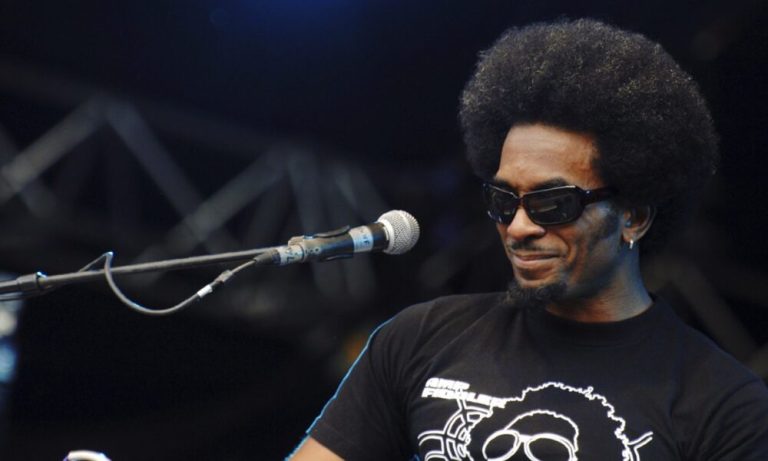Amp Fiddler has performed with Parliament-Funkadelic, Prince, and many others during his career.
Joseph “Amp” Fiddler, the famed Detroit musician who played with Parliament and Funkadelic, helped launch J Dilla and more, has died. He was 65 years old.
Fiddler’s death was announced in a statement shared on his official Instagram page. He died after a long and noble battle against cancer ”, although no further details were given.
“ We face the insurmountable responsibility of sharing in the passing of Joseph ‘Amp’ Fiddlerwe can read in the press release. Our beloved ‘Amp’ Fiddler, world-famous ambassador of funk, soul and electronic music, keyboardist, producer, Afro-futurist and force of light who guided so many, has passed away at the age of 65 years… It would be impossible to summarize the gravity of his energy, his global impact and his contributions. His life’s work, his legacy and, above all, his LOVE will far exceed his presence on earth. We are lucky to have known Amp Fiddler in this life. »
Fiddler’s family is also seeking donations to help cover funeral costs. Donations can be made to a previously launched GoFundMe page to help cover Fiddler’s medical costs and recovery following surgery and a lengthy hospital stay in 2022.
Throughout his career, Fiddler has made a multitude of contributions to the worlds of funk, soul, hip-hop and dance music. In addition to his work with George Clinton in Parliament-Funkadelic, he has collaborated with artists such as Prince, Sly & Robbie, Carl Craig and Moodymann. He gave J Dilla his first Akai MPC drum machine and introduced the future hip-hop legend to Q-Tip and A Tribe Called Quest.
Born in 1958, Fiddler grew up in Detroit, surrounded by music. He plays the piano, but is also enthusiastic about the rising wave of synthesizers and drum machines. His first big gig came when he joined the R&B/soul group Enchantment, with whom he spent several years. In the early 1980s, he also produced his own music, including a 1980 single, ” Spaced Outta Place », under the name Sundown. Through his growing network of musical connections, Fiddler eventually became part of Clinton’s P-Funk universe.
In an interview with the Red Bull Music Academy in 2017, Fiddler said it was ” the biggest breakthrough of my career, like a dream come true “. He added : ” I think what got me the job was that I was consistent in practicing and recording and being on the right wavelength. I just want to keep learning. All the other keyboard players were at odds with each other and couldn’t get the job done because they were too busy talking to each other about egos and bullshit. I was like, “Yeah, man, that’s cool. Show me what you got, let me learn it. Show me where I should play.” »
During his time with P-Funk, and certainly afterward, Fiddler became a session musician and essential collaborator. He played on “ We Can Funk » by Prince, What Up, Dog from Was (Not Was), Seal’s 1994 self-titled album and Maxwell’s 1996 debut album, Maxwell’s Urban Hang Suite. Fiddler and his brother, Thomas “Bubz” Fiddler, also recorded a record together, With Respect, released in 1991 under the name Mr Fiddler.
It was in the early 1990s that Fiddler met J Dilla, who was then part of the hip-hop trio Slum Village. Already amazed by Dilla’s ability to create beats by looping cassettes, Fiddler introduced him to MPC and helped open up a whole new sonic frontier for hip-hop.
“ He assembled so much music from so many different records that it worked like a puzzle or a picturerecalls Fiddler during the interview with Red Bull. It was quite a talent to do that alone. When he started cutting samples and loops into beats and making his own beats, he had a beat like no one else I’ve ever heard. »
Of Dilla’s presentation at Q-Tip, he adds: “ I really didn’t expect anything, because I did it out of the goodness of my heart. I just wanted Detroit to be on the hip-hop map. This was something that had not yet happened in Detroit. »
The 2000s saw Fiddler launch his solo career. In 2003, he released the EP Love and War, closely linked to his work with house producer Moodymann. The following year, he released his first album, Waltz of a Ghetto Fly, followed by another in 2006, Afro Strut. In 2008, he teamed up with Jamaican duo Sly and Robbie for the production and rhythm section of the album Inspiration Information.
Amp Fiddler remained prolific throughout the 2010s and 2020s. He released several more solo albums and worked closely with Detroit artist Will Sessions. Works from his long-running Basementality series were collected into a single album in 2021, while last June he teamed up with Luke Solomon for a new single, “ Come On Over “.
As Amp Fiddler stated in the 2017 interview, his career has allowed him to “ being a part of a lot of Detroit music in different ways “. He then captured what makes the city, and its historic musical output, so unique, saying: “ We are all passionate and we are a community of musicians who respect each other and love what they do… I think what creates love and makes music so successful is that we don’t ask each other how much we have to pay (each other) to play on something or all this nonsense. It’s always “I need you to do this for me, and it’s going to be great.” The experience and the music are the reward. Our unity is what makes the city extraordinary, I think it’s the magic of Detroit. »






